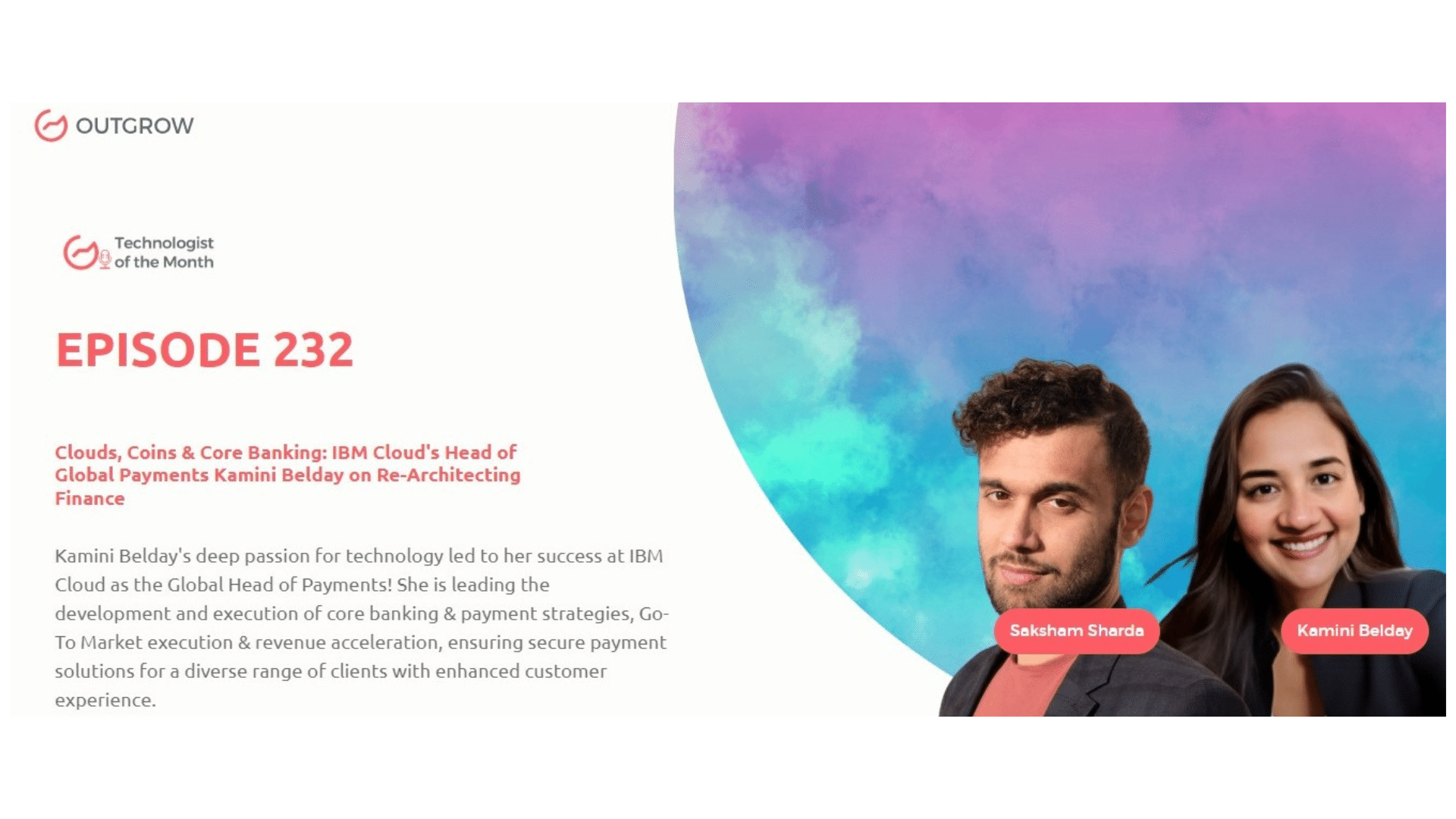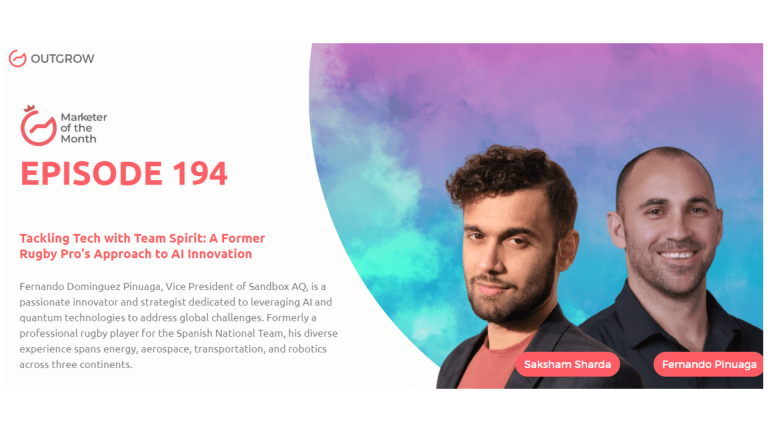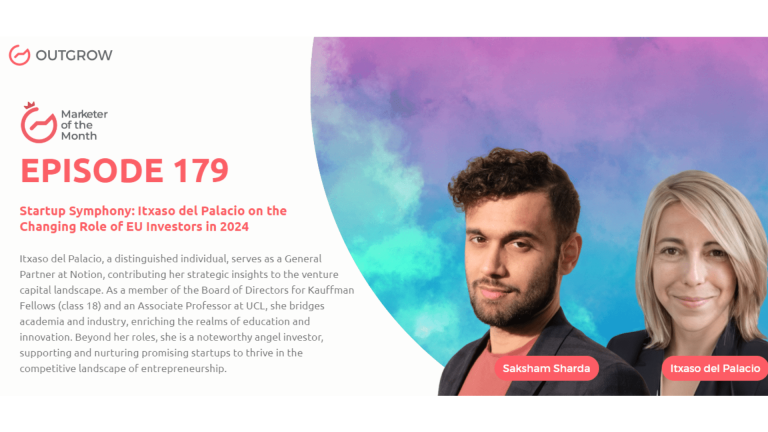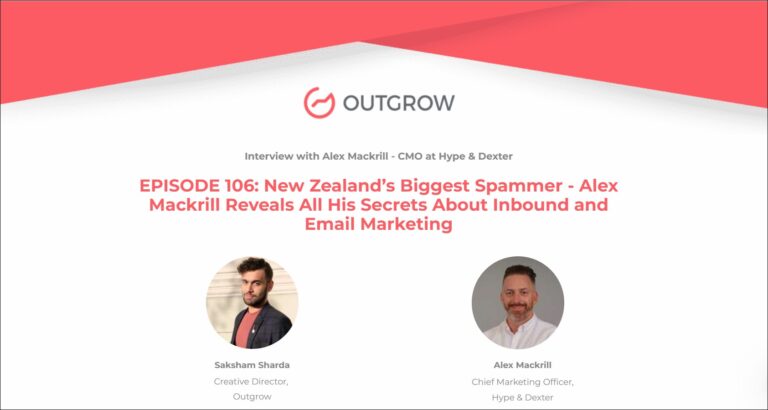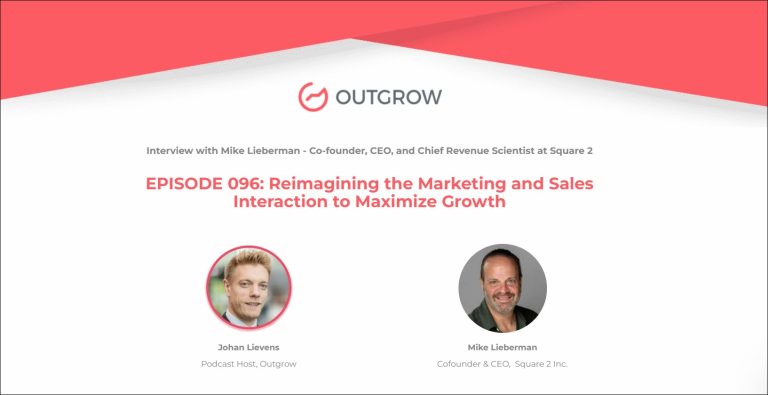EPISODE 232: Marketer of the Month Podcast with Kamini Belday
Table of Contents
Hey there! Welcome to the Marketer Of The Month blog!
We recently interviewed Kamini Belday for our monthly podcast – ‘Marketer of the Month’! We had some amazing insightful conversations with Kamini and here’s what we discussed about-
1. Embedded Payments Revolution – Seamless transactions in IoT and EVs.
2. Cross-Border Real-Time Payments – Pushing limits of traditional SWIFT methods.
3. AI-Powered Fraud Prevention – Predictive security replacing reactive approaches.
4. Stablecoin and CBDC Innovation – Digital currencies taking center stage.
5. Hybrid Cloud Banking Benefits – Microservices architecture over monolithic systems.
6. The Four R’s Strategy – Retire, replatform, re-architect, rebuild, modernize.
About our host:
Dr. Saksham Sharda is the Chief Information Officer at Outgrow.co He specializes in data collection, analysis, filtering, and transfer by means of widgets and applets. Interactive, cultural, and trending widgets designed by him have been featured on TrendHunter, Alibaba, ProductHunt, New York Marketing Association, FactoryBerlin, Digimarcon Silicon Valley, and at The European Affiliate Summit.
About our guest:
Kamini Belday’s deep passion for technology led to her success at IBM Cloud as the Global Head of Payments! She is leading the development and execution of core banking & payment strategies, Go-To Market execution & revenue acceleration, ensuring secure payment solutions for a diverse range of clients with enhanced customer experience!
Clouds, Coins & Core Banking: IBM Cloud’s Head of Global Payments Kamini Belday on Re-Architecting Finance
The Intro!
Saksham Sharda: Hi, everyone. Welcome to another episode of Outgrow’s Marketer of the Month. I’m your host, Dr. Saksham Sharda, and I’m the creative director at Outgrow. co. And for this month we are going to interview Kamini Belday, who is the Head of Global Payments at IBM Cloud.
Kamini Belday: Great to be here. Thank you.
Don’t have time to read? No problem, just watch the Podcast!
Challenge yourself with this trivia about the exciting topics Kamini Belday covered in the podcast.
Or you can just listen to it on Spotify!
The Rapid Fire Round!
Saksham Sharda: Alright, so let’s start with the rapid fire rounds to break the ice. The first question is, at what age do you want to retire?
Kamini Belday: Today.
Saksham Sharda: How long does it take you to get ready in the mornings?
Kamini Belday: 20 minutes.
Saksham Sharda: Most embarrassing moment of your life?
Kamini Belday: When my son was playing tennis and I didn’t know not to cheer when the opponent doubles falls.
Saksham Sharda: Favorite color?
Kamini Belday: Lavender.
Saksham Sharda: What time of day are you most inspired?
Kamini Belday: 5:30 Am in the morning.
Saksham Sharda: How many hours of sleep can you survive on?
Kamini Belday: At minimum six hours, maximum ten.
Saksham Sharda: The city in which the best kiss of your life happened?
Kamini Belday: New York.
Saksham Sharda: Pick one. Sam Altman or Mark Zuckerberg?
Kamini Belday: Mark Zuckerberg.
Saksham Sharda: How do you relax?
Kamini Belday: Watching my kids play tennis or binge-watching with my husband on Netflix.
Saksham Sharda: How many cups of coffee do you drink per day?
Kamini Belday: I used to drink three, now two.
Saksham Sharda: A habit of yours that you dislike?
Kamini Belday: Overthinking.
Saksham Sharda: The most valuable skill you’ve learned in life.
Kamini Belday: Today is truly present.
Saksham Sharda: Your favorite Netflix show?
Kamini Belday: Diplomat. Season two.
Saksham Sharda: Are you an early riser or a night owl?
Kamini Belday: Early riser by far.
Saksham Sharda: One-word description of your leadership style?
Kamini Belday: Empathy, empathetic.
Saksham Sharda: Coffee or tea to kickstart your day?
Kamini Belday: Coffee.
Saksham Sharda: Top priority in your daily schedule?
Kamini Belday: Number one is to exercise, and number two is to really make a difference in a client conversation.
Saksham Sharda: Ideal vacation spot for relaxation?
Kamini Belday: I am not a beach vacation type of person, but mostly history. So, just getting lost in the history that inspires me.
Saksham Sharda: A key factor for maintaining a work-life balance?
Kamini Belday: Setting the expectation with your management, but more importantly, really having a sticky note with the key priority items day by day. I have my to-do list first thing in the morning.
The Big Questions!
Saksham Sharda: That was the end of the rapid fire. Now we’ll go on to the longer questions, which you can answer as much time and ease as you like. The first one is that your technology journey began during the PC boom of the 1990s. Can you share what drew you to tech and banking specifically, and how that initial interest has evolved into your current role at IBM Cloud?
Kamini Belday: That is a great question. So I was born in a house where my dad is a banker. He was a banker for one of the largest banks in India to start with. So early on, I understood what the check payment was, like he really introduced us when I was five. And understanding of building a trust with the clients, understanding the precision in the numbers, and the finance, it was pretty much in my DNA to begin with. And when I was in college, having a Netscape Mosaic, which was the first browser in the 90s launch, followed by an iMac laptop in my college, really opened up a door and excited me about what could be the potential opportunities in the technology, in the computer science world. So after college and having that early exposure in the banking industry and the technology, which was changing drastically, really set me up for the path I’m on today. And also in between, I had a consulting career where my first job was on Wall Street working for Goldman Sachs. And that’s where I really hit with that intersection of technology and banking can really change the world. And now, looking back, I worked from then on at Citibank for 17 years. I played many roles, business, technology side. And now IBM, I’m helping clients to modernise technology with their core banking platforms. So it’s a no-brainer for me to just build upon what I have learned throughout my career.
Saksham Sharda: What are the most exciting innovations that you see happening right now in the world of global payments and cloud banking?
Kamini Belday: Global payments, let’s start from there. IBM has been the leader for core banking platforms for decades, if not centuries. They are the first ones who introduced the check processor, like in what,1920, if not before that, right? So coming from that to the digital assets to the stable coin we heard yesterday, it’s a quiet journey in global payments. So the biggest innovation I have seen is the embedded payments, right? So if you look at it, not just Uber, like I had women in payments, I had a co-panellist from Qualcomm, and we talked about how the payment is seamless in the IoT, including the cars, including paying the tolls, the EVs, and everything else, EV charging. So that fascinates me, that embedded payments in everything we do, where payment is completely seamless. The second part is the cross-border payments, the real-time payments, right? So it’s not just for domestic, but also the cross-border payments, which are really pushing the limits of the traditional methods like SWIFT, right? And having that ability to settle the payment right away, in-home and overseas, I think that’s something I’m really excited about. And IBM puts a lot of energy behind those rails. There are many, but AI, we have seen it, Stablecoin, and CBDC, which is a government-backed digital currency, are taking centre stage in many parts of the world today. And last but not least is the security. No matter what we do, fraud is the centre of everything we do, right? So, how do you really help to combat the fraud, but more importantly, predict it with the predictive AI and prevent it? I think that’s a lot more exciting. And there are so many different ways to dissect, but those are the five things that stand out to me from a global payment side. From the IBM cloud side, or just in general, the cloud side, I would say number one is the interoperability, right? That you have a check account, you have a mortgage account, you have a Stablecoin, how do you make sure that your credentials, account credentials, and card credentials in your Apple Wallets to everywhere is safe? And it saves time for people to operate from the same credentials in a different part of the world, with different payment methods, as well as different types of payment methods. So that’s the number one, in my opinion. And the second part is mostly about banking as a service with the composable architecture, right? That you cannot just, you know, build the API cloud infrastructure for tier one banks working in a major global bank. Clearly, it defines that. I think when I read it, about 85% of workload it’s still on the mainframe in a monolithic fashion. I’m talking about a system of records, right? I’m talking about true core banking processing that happens in a non-cloud environment. So, how do you move the data from a system of records to a system of engagement? AI is the system of insights, right? So that’s only possible with the API microservice-driven architecture, which the cloud allows. So having that composable architecture, banking as a service, and the majority of the fintechs here, that’s what they offer. Out of the box, you can have account opening, you can have a KYC, you can have a lending capability, right? So those are the key trends that cloud technology allows bank to modernise their infrastructure.
Saksham Sharda: How do banks ensure scalability and future-proofing while implementing all these modern security and compliance solutions?
Kamini Belday: It is a very good question. And it’s a fine act, a fine balancing act, because it’s not easy for any bank to just flip the switch, right? It requires them to really invest in the governance that before they introduce any new technology, what can be the potential risks? So, having that governance risk framework ethics in place as a founding principle certainly helps. So that’s number one. In terms of scalability, you don’t have to move everything at once. Start, you still have on-prem applications, and there will be some of the workloads will be on a mainframe over the next decade, right? So, having that incremental modernisation plan, understanding what we can, we used to call the four R’s, which are retire, which one application is not used today. And easy to really retire, right? So the retire is the first one. The second one is the replatform. Can we literally lift and shift and make it quickly the cloud network, right? So that’s another one. The third one is the re-architect, right? That’s where you still need that business capability, but you need a new architecture. And the last one is the rebuild, right? That which is not in existence, not possible for us to modernise, but let’s just bring a partner or bring somebody who has done this, if not bring the talent who can help us to build it. So that’s how I see that it’s not an overnight job. It won’t be an overnight job for the next few years, but really understanding your appetite for risk, understanding your priorities. If time to market is a priority, I would rather go with the last R than go find a partner, rebuild it. Your priority is to really PCO, then figure out which is the total cost of savings, then figure out what is not working, retire and repurpose that money somewhere else.
Saksham Sharda: How exactly do you then see hybrid cloud and AI transforming the payments landscape in general?
Kamini Belday: Hybrid cloud allows, as I said, the majority of the banks to have a leapfrog from monolith on-prem to the microservice-based architecture. So that’s number one. The hybrid cloud also allows them to take advantage of the latest technologies like AI, for example, right? Which allows them to understand the customer patents, customer spending patents, and helps provide them a personalised experience. So if I buy shoes on Amazon, and if I like a brand, it happens to be a tennis brand, for example. So they would have a recommendation for me on what the best category of sneakers in the tennis industry, for example, right? So having that personalised experience, personalised way to target the new products allows them to not just build innovation, but accelerate the growth. So that’s definitely happening. And we have seen many use cases there. It also helps us to understand the security. So, one of the cloud architectures we call the zero-trust architecture, right? So no implicit trust. And what it does is that by default, we deny everything. So every single workload, transaction flowing from one point to another, it’s constantly checking for authentication, making sure it’s the right authorization. So there is no identity theft. But at the same time, it’s fast enough to get settled in a required timeframe. So having that scalability built in compliance, security, end-to-end, having the ability to scale up with the AI, and at the same time, having the flexibility to modernise at your own pace. I think cloud and AI, hybrid cloud and AI, are really clear, distinct factors for any modernisation.
Saksham Sharda: Speaking of use cases, are there any real-world examples where hybrid cloud and AI have already improved payment efficiency or security?
Kamini Belday: Yeah, let’s start with the fraud. Like, you know, it used to be a manual fraud, depending on, and it was very reactive. If you call it in a decade ago, if there is a misuse of your credit card transaction, you get a call asking if you made this purchase? Like I had, my son was using my card. He was in Europe, and I was in New York. We both went to a coffee shop at the same time. And I got the fraud alert, and he got rejected on his transaction because mine went through there. You cannot be in two countries at the same time, right? So by the time I got the transaction alert, I paid attention, and I called them back. It was too late. In this case, it wasn’t the fraud, but having that fraud built in, the response to the fraud was delight. With the hybrid cloud and AI, you can build this in a rule set where people can really understand what the fraud patterns are based on your behaviours, based on your travel plans, based on your spending habits, and really vet out the false positives, right? And I have seen significant differences in fraud detection as well as fraud prevention, leveraging the AI machine learning, as well as the hybrid cloud.
Saksham Sharda: So it’s inspiring to see your dedication to supporting women and girls in IT through mentorship. What motivated you to start this initiative, and what stories of growth or success have stood out to you along the way?
Kamini Belday: There are many. I would start, you know, when I joined a workforce after finishing my computer science, I realised that not many people in the room I was there, either it’s a Goldman job or any other job, look like me, talk like me or just women in general, you know, it was very male-dominated finance technology world. But I was fortunate enough to have leaders, men and women both, who really saw the potential before I saw myself, and they helped me to navigate the world. And they nominated me for the role, which I thought I was not ready for. But they figured out that some of the transferable skills, soft skills, the technical skills I had, which allowed me to climb the career at a much accelerated rate. So having that, I just thought it’s a no-brainer. I had to pay back, you know, that’s as a human, that’s a list you can do. And when I was nominated to chair women’s leadership at one of the largest banks, I saw firsthand the support and at the same time the need for mentorship, and what it can do wonders to women like myself. So when I came here to Money 20/20, I’ve been coming for many years now, and Rise Up and Amplify, I’ve been speaking. And now it’s official that I’m the mentor, and I’m very privileged that I have a mentee. I feel sense of urgency and responsibility to help out. And it’s at the end of the day, it’s not about making myself known as a mentor, but really helping others to see their potential, like how my mentors speak for myself. And that’s the difference I would like to make.
Saksham Sharda: What do you think then other organisations in tech and finance can do to scale similar mentorship efforts and make the industry more inclusive overall?
Kamini Belday: So yesterday, Tracy, chairman of the Money 20/20, had talked with us at the Rise Up and Amplify. And she mentioned that based on the survey, banking has seen the highest decline in women in leadership roles. And that is a very eye-opening fact. Unfortunate, but it’s a fact. Where I come from and I have seen, and including myself, unconscious bias, I think that is the biggest contributor. Again, it’s Kami’s opinion. I don’t know the survey is really out there. And we all have it. We don’t realise that we have that unconscious bias. But having a formal training in other financial or any other enterprises opens up the eyes with real-time examples. It’s the very first thing anybody can do. And second part is to have a formal agenda. So in one of my prior roles, we had an agenda to have a 30% club, which is every layer of the organisation. We wanted to have a 30% women’s presence at the table, starting from the CEO table, all the way to the developer programmer level. So having those metrics where you have visibility, accountability to promote, retain, and grow the minority, as well as the women’s population. I think that is a key. And then the third thing is, how do you enable that? And that comes with the programmes like I chaired before women’s leadership programme, where you can introduce as simple as building executive presence, building a mentor relationship, and have some high potential pair up with some of the executives on a daily basis, allows them to see what could be the potential future for them. So there are many ways, but in my mind, having an unconscious bias training, targeted with a certain specific use case, having an official agenda to grow a certain population, like women, minorities in a certain roles, and having their resources, allowing them to grow, I think those are the keys.
Saksham Sharda: So we have a bonus question, which is, what does your typical day look like? You wake up in the morning, and what is it? Are there meetings, are there emails? How much of your time is meetings? Tell us about your day.
Kamini Belday: So my day starts very early. I’m an early riser. So I drop my husband, first thing to do, we have only one car, because second car, my son took it to college. So I dropped him, and then I had my one-on-one exercise. So I finished that. And then after my workout, shower, coffee, and then my day starts, where I really start. At eight o’clock, my day starts. And it starts with really looking at my diary, looking at what my agenda is, and making it a to-do list, but also prioritising it, right? So what are the top three things I want to get out of? So I have a sticky in my room. So first thing I do is looking at my agenda, looking at the deliverables and meetings and everything else I prioritise. What I need to do, I must do, and then nice to have. And then, if time permits, what other things can I do? So usually I work remote, unless I am travelling for a client meeting or some of the corporate meetings there. And then my lunch is pretty much either learning about something new. I make time for myself every day. I call it a snack hunting. So where I pretty much look up either news or something in my field that really inspires me to learn something new. I also like to learn about tennis. I check on, thanks to my son, but not junior, but also the ATP. I follow like the French Open. I follow very closely. So if time permits, I look at the highlights. If not, I watch a game or two here and there. And then I also spend more time understanding what could be the next step in terms of closing the deal for a client, bringing the extra revenue. What are the creative ways we can go and build a product? So that’s snack timing, slash reading, and educating myself. So that’s in a nutshell, dinner, early dinner. We are not early birds, but we have an early dinner when my husband comes back. And yeah, and last hour, now my kids are grown up, but we used to watch 6:30 if you’re in New York or in the US, you know, ABC World News with David Moore. That’s must to do. Jeopardy followed by, and the last one is the Wheel of Fortune. So that hour and a half used to be with me and my kids. And then we can go finish up the rest of the day. But yeah, so that’s in a general priority is to self-care, which starts with the gym or the short run or a walk, and ends with my kids learning about the world.
Saksham Sharda: So the very last question then is based on more like you said, your dad was in banking, you’re in banking, and tech. The last question we ask all our speakers is of a personal kind: what would you be doing in your life if not this?
Kamini Belday: Oh, many, many things. I want to open an NGO, but that’s beside the point. If I were not in a computer field or where I am, I would have been a gemologist. I love learning about, I love jewellery, number one, as you can tell, I have the jewellery I’m wearing. But I love semi-precious, precious stones, learning about their characteristics. So I would have been a gemologist, if not open up my own jewellery shop around that. The second thing I like is the architecture. I really like architecture inspired by Gothic architecture. You know, some of the Indian you know, the Rajasthan and Gujarat, where I’m from, you know. So, really having that architecture view, architecture digest is another area that I really just cuddle up and read about, right? And through both channels, the idea is to help the true artists to shine and give them a platform to shine on. So that’s something I would like to do if I retired today.
Let’s Conclude!
Saksham Sharda: Thanks, everyone for joining us for this month’s episode of Outgrow’s Marketer of the Month. That was Kamini Belday, who is the Head of Global Payments at IBM Cloud.
Kamini Belday: Great to be here. Thank you.
Saksham Sharda: Check out the website for more details and we’ll see you once again next month with another marketer of the month.

Muskan is a Marketing Analyst at Outgrow. She is working on multiple areas of marketing. On her days off though, she loves exploring new cafes, drinking coffee, and catching up with friends.

